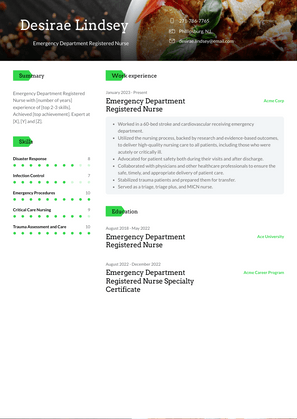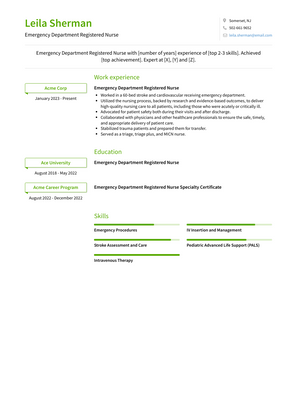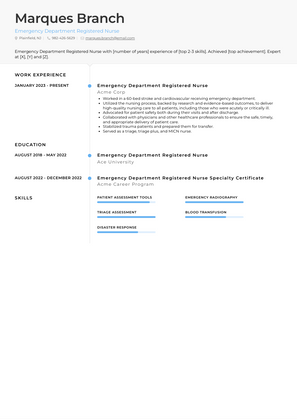3+ Emergency Department Registered Nurse Resume Examples and Templates
This page provides you with Emergency Department Registered Nurse resume samples to use to create your own resume with our easy-to-use resume builder. Below you'll find our how-to section that will guide you through each section of a Emergency Department Registered Nurse resume.



What do Hiring Managers look for in an Emergency Department Registered Nurse Resume
- Critical Thinking: The ability to make quick and accurate clinical assessments in high-pressure situations.
- Emergency Response: Proficiency in emergency medical procedures, including trauma care and life-saving interventions.
- Communication Skills: Effective communication with patients, families, and interdisciplinary teams in fast-paced and critical situations.
- Adaptability: Flexibility to handle a wide range of medical emergencies and adapt to changing conditions.
- Compassion and Empathy: Demonstrating compassion and empathy while providing care to patients experiencing medical crises.
How to Write an Emergency Department Registered Nurse Resume?
To write a professional Emergency Department Registered Nurse resume, follow these steps:
- Select the right Emergency Department Registered Nurse resume template.
- Write a professional summary at the top explaining your Emergency Department Registered Nurse’s experience and achievements.
- Follow the STAR method while writing your Emergency Department Registered Nurse resume’s work experience. Show what you were responsible for and what you achieved as an Emergency Department Registered Nurse.
- List your top Emergency Department Registered Nurse skills in a separate skills section.
Before we proceed any further, checkout our medical resume templates that are loved by thousands of medical professionals.
How to Format an Emergency Department Registered Nurse Resume?
To format your Emergency Department Registered Nurse Resume:
- You can create a resume from scratch, use a resume builder, or use a Google doc resume templates or Word resume template.
- Make sure to select the right resume layout. You can pick from reverse chronological format, combination resume format or a functional resume format.
- Include some or all of these sections within your resume: resume header, summary or objective, resume experience, skills, certifications, education, portfolio, interests, achievements, references, or your publications.
- Make sure that you have an ATS friendly resume template. Your resume can look good, but you are likely to be filtered through an ATS system.
- You can take feedback from friends/family/colleagues, use an AI resume builder, or even use a professional resume formatting or review service if you are unsure.
- If you are still unsatisfied with your resume’s formatting, consider a professional resume writing service.
How to Write Your Emergency Department Registered Nurse Resume Header?
Write the perfect Emergency Department Registered Nurse resume header by:
- Adding your full name at the top of the header.
- Add a photo to your resume if you are applying for jobs outside of the US. For applying to jobs within the US, avoid adding photo to your resume header.
- Add your current ED Registered Nurse position to the header to show relevance.
- Add your current city, your phone number and a professional email address.
- Finally, add a link to your portfolio to the Emergency Department Registered Nurse resume header. If there’s no portfolio link to add, consider adding a link to your LinkedIn profile instead.
Bad Emergency Department Registered Nurse Resume Example - Header Section
Deon 682 Fifth St. South Plainfield, NJ 07080 Marital Status: Married, email: cooldude2022@gmail.com
Good Emergency Department Registered Nurse Resume Example - Header Section
Deon Nguyen, Plainfield, NJ, Phone number: +1-555-555-5555, Link: linkedin/in/johndoe
Make sure to add a professional looking email address while writing your resume header. Let’s assume your name is John Doe - here is a formula you can use to create email addresses:
- firstnamelastname@email.com - johndoe@email.com
- firstname.lastname@email.com - john.doe@email.com
- lastname.firstname@email.com - doe.john@email.com
- f.lastname@email.com - j.doe@email.com
- l.firstname@email.com - d.john@email.com
- firstnamelastname12@email.com - johndoe12@email.com
For a Emergency Department Registered Nurse email, we recommend you either go with a custom domain name (john@johndoe.com) or select a very reputed email provider (Gmail or Outlook).
How to Write a Professional Emergency Department Registered Nurse Resume Summary?
Use this template to write the best Emergency Department Registered Nurse resume summary: Emergency Department Registered Nurse with [number of years] experience of [top 2-3 skills]. Achieved [top achievement]. Expert at [X], [Y] and [Z].
How to Write a Emergency Department Registered Nurse Resume Experience Section?
Here’s how you can write a job winning Emergency Department Registered Nurse resume experience section:
- Write your Emergency Department Registered Nurse work experience in a reverse chronological order.
- Use bullets instead of paragraphs to explain your Emergency Department Registered Nurse work experience.
- While describing your work experience focus on highlighting what you did and the impact you made (you can use numbers to describe your success as a Emergency Department Registered Nurse).
- Use action verbs in your bullet points.
Emergency Department Registered Nurse Resume Example
Emergency Department Registered Nurse
- Worked in a 60-bed stroke and cardiovascular receiving emergency department.
- Utilized the nursing process, backed by research and evidence-based outcomes, to deliver high-quality nursing care to all patients, including those who were acutely or critically ill.
- Advocated for patient safety both during their visits and after discharge.
- Collaborated with physicians and other healthcare professionals to ensure the safe, timely, and appropriate delivery of patient care.
- Stabilized trauma patients and prepared them for transfer.
- Served as a triage, triage plus, and MICN nurse.
Top Emergency Department Registered Nurse Resume Skills for 2023
- Triage Assessment
- Emergency Medicine
- Critical Care Nursing
- Advanced Cardiac Life Support (ACLS)
- Pediatric Advanced Life Support (PALS)
- Trauma Assessment and Care
- Rapid Response Teams
- IV Insertion and Management
- Medication Administration
- Patient Monitoring
- EKG Interpretation
- Emergency Interventions
- Ventilator Management
- Wound Care
- Intravenous Therapy
- Airway Management
- Emergency Procedures
- Patient Stabilization
- Pain Management
- CPR (Cardiopulmonary Resuscitation)
- Blood Transfusion
- Radiology and Imaging Interpretation
- Emergency Equipment Operation
- Infection Control
- Disaster Response
- Emergency Medical Records Documentation
- Emergency Medication Calculation
- Patient and Family Education
- Sepsis Recognition and Treatment
- Stroke Assessment and Care
- Shock Management
- Burn Care
- Poisoning and Overdose Management
- Ethical and Legal Considerations in Emergency Care
- Emergency Department Triage Systems
- Electronic Health Records (EHR) in Emergency Care
- Crisis Intervention
- Trauma Nursing
- Emergency Department Workflow
- Pain Assessment Scales
- Patient Assessment Tools
- Emergency Radiography
- Emergency Ultrasound
- Emergency Laboratory Testing
- Emergency Department Protocols
- Disaster Preparedness
- Emergency Response Team Coordination
- Interdisciplinary Communication in Emergencies
- Emergency Department Quality Improvement
- Emergency Department Leadership and Supervision
How Long Should my Emergency Department Registered Nurse Resume be?
Your Emergency Department Registered Nurse resume length should be less than one or two pages maximum. Unless you have more than 25 years of experience, any resume that’s more than two pages would appear to be too long and risk getting rejected.
On an average, for Emergency Department Registered Nurse, we see most resumes have a length of 2. And, that’s why we advise you to keep the resume length appropriate to not get rejected.
Frequently Asked Questions (FAQs) for Emergency Department Registered Nurse Resume
-
What does an Emergency Department Registered Nurse do?
- An Emergency Department Registered Nurse (ED RN) provides nursing care to patients in emergency situations, including assessing patients' conditions, administering treatments, and coordinating with healthcare teams to stabilize patients and ensure timely care.
-
What qualifications are important for an Emergency Department Registered Nurse position?
- Qualifications typically include a nursing degree (e.g., Bachelor of Science in Nursing), licensure as a Registered Nurse (RN), and certification in emergency nursing (such as Certified Emergency Nurse - CEN). Experience in emergency care, strong clinical skills, and proficiency in life-saving procedures (such as CPR and Advanced Cardiac Life Support - ACLS) are essential.
-
What kind of experience should an Emergency Department Registered Nurse highlight on their resume?
- Experience in emergency nursing, including triaging patients, managing trauma cases, administering medications, and collaborating with emergency medical teams, is crucial for an ED RN. Highlighting proficiency in critical thinking, rapid assessment, and effective communication is important.
-
How important is it for an Emergency Department Registered Nurse to demonstrate critical thinking skills on their resume?
- Critical thinking skills are vital for an ED RN as they are responsible for making quick and accurate assessments of patients' conditions and determining appropriate interventions. Highlighting experience in prioritizing care, adapting to changing situations, and making sound clinical decisions is essential.
-
Should an Emergency Department Registered Nurse include their experience with trauma care on their resume?
- Yes, mentioning experience with trauma care, including managing patients with critical injuries, performing emergency procedures (such as intubation or chest tube insertion), and coordinating with trauma teams, can demonstrate the RN's ability to handle high-stress situations and provide life-saving interventions.
-
What soft skills are important for an Emergency Department Registered Nurse to highlight on their resume?
- Soft skills such as communication, teamwork, empathy, adaptability, and resilience are crucial for an ED RN. These skills contribute to effectively interacting with patients and families in crisis, collaborating with interdisciplinary teams, and maintaining composure in fast-paced environments.
-
Is it necessary for an Emergency Department Registered Nurse to mention their experience with emergency protocols and procedures on their resume?
- Yes, mentioning experience with emergency protocols and procedures, including knowledge of emergency care standards, medication administration guidelines, and infection control practices, can demonstrate the RN's competency in providing safe and effective care in emergency situations.
-
How should an Emergency Department Registered Nurse tailor their resume for different types of emergency departments?
- An ED RN should highlight experience and skills relevant to the specific types of emergency departments they have worked in, whether it's a Level I trauma center, community hospital, pediatric emergency department, or urgent care center. Emphasizing familiarity with specialized patient populations and protocols can be beneficial.
-
Should an Emergency Department Registered Nurse include their educational background on their resume?
- Yes, including educational background such as degrees, certifications, or relevant coursework in nursing, emergency care, or trauma nursing is important. This provides credibility and demonstrates the foundational knowledge necessary for the role.
-
How can an Emergency Department Registered Nurse make their resume visually appealing and easy to read?
- Utilizing clear headings, bullet points to highlight key skills and experiences, and a professional layout are important aspects of resume formatting. Additionally, including specific examples of successful patient outcomes or commendations, along with quantifiable metrics (such as patient satisfaction scores or response times), can enhance the overall presentation of the resume.
-
What do Hiring Managers look for in an Emergency Department Registered Nurse Resume
-
How to Write an Emergency Department Registered Nurse Resume?
-
How to Format an Emergency Department Registered Nurse Resume?
-
How to Write Your Emergency Department Registered Nurse Resume Header?
-
How to Write a Professional Emergency Department Registered Nurse Resume Summary?
-
How to Write a Emergency Department Registered Nurse Resume Experience Section?
-
Top Emergency Department Registered Nurse Resume Skills for 2023
-
How Long Should my Emergency Department Registered Nurse Resume be?
-
Frequently Asked Questions (FAQs) for Emergency Department Registered Nurse Resume
Copyright ©2024 Workstory Inc.
